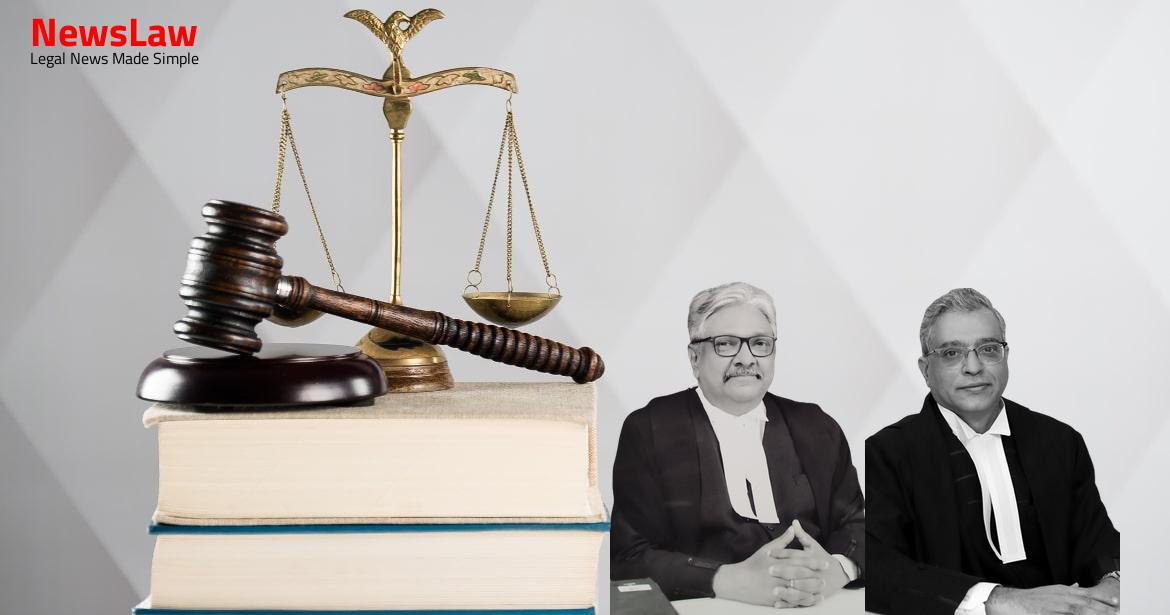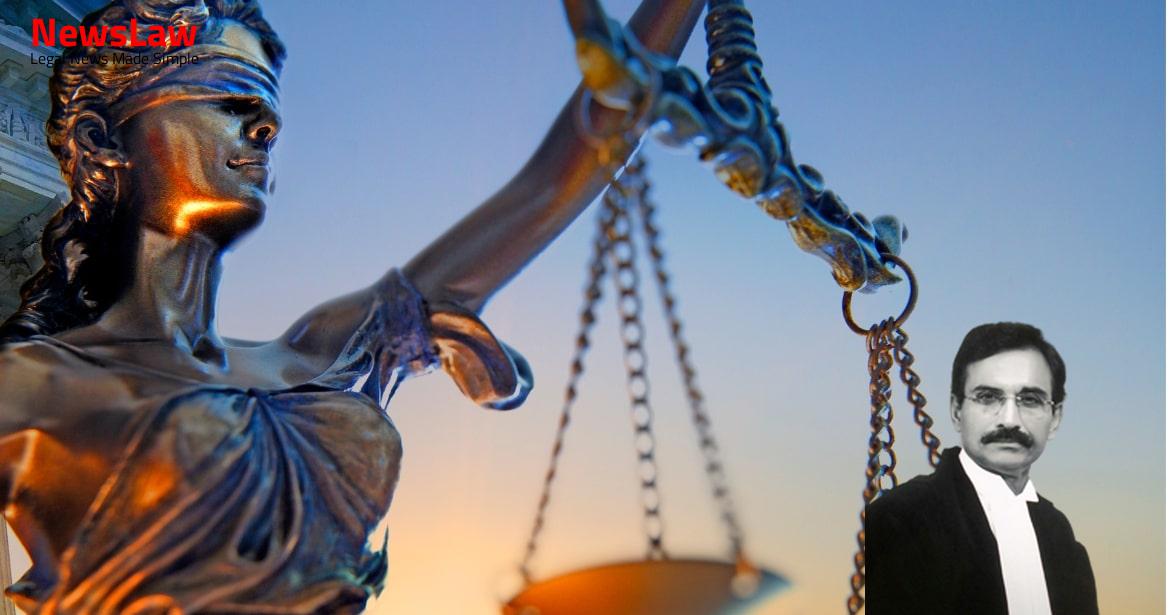Delve into the intricate legal analysis conducted by the court in a recent case concerning the violation of toll plaza location rules. The judgment focuses on the importance of recording reasons in administrative actions, highlighting the need for transparency and fairness in decision-making processes. The interpretation of relevant rules and the court’s emphasis on adherence to legal and procedural requirements provide valuable insights into the case.
Facts
- Writ Petition filed to challenge the construction of a toll plaza at 194 km of NH-30 in Bihar
- Allegations of ground conditions changing during the preparation of the Detailed Project Report (DPR)
- Judgment allowed the Writ Petition, directing the shifting of the toll plaza to a different location
- Concerns raised about toll plaza location causing difficulties for local residents
- NHAI, Chairman, and General Manager filed LPA against the Writ Petition decision
- The main issue was the violation of Rule 8 of the National Highways Fee Rules, 2008
- Commercial institutions also emerged in the area creating further concerns
- Writ Petitioners were not required to establish a cause of action for the Writ Petition.
- NHAI was expected to explain why commercial viability was prioritized over statutory requirements.
- Construction of NH30 section was not primarily for the municipal area residents, as per affidavits.
- The scope of the second proviso was discussed along with related case law.
- Responsibility of Executing Authority/Concessionaire decreased with greater distance from the toll plaza.
- Recording of reasons was deemed necessary by the Single Judge to conform to principles of justice and legislative intent.
- Appellants were unaware of toll plaza location classification until the matter reached the court.
- Division Bench emphasized the importance of statutory violations concerning the public, rather than commercial viability.
- Fundamental Rights were not implicated in the case, and Writ Petitioners were criticized for approaching the court with ‘unclean hands.’
Also Read: Legal Analysis of Lease Deed Commencement Date
Arguments
- The learned Single Judge finds that Rule 8 was violated, giving the court jurisdiction under Article 226.
- The DPR allows the Authority to place the toll plaza within municipal or town limits.
- The project road was over 50 kilometers, with a congested stretch mentioned in the DPR.
- The Concessionaire argues that widening National Highway 181.30 was to ease traffic pressure, violating both a rule and fundamental rights.
- The NHAI’s counter-affidavit argues that the toll plaza installation does not violate Rule 8, even within municipal limits.
- The DPR consultant determined the toll plaza location considering various factors like ground conditions and traffic density.
- There were claims that moving the toll plaza would cause traffic leakage and impact project viability.
- The executive summary of the DPR is discussed in relation to the parties’ contentions.
- The court found a violation of Rule 8 with the toll plaza location and highlighted the impact on local residents and toll tax imposition.
- Various arguments were presented regarding the DPR’s compliance with Rule 8.
- In the first counter affidavit filed by the Municipal Council 96 of Patna, it was stated that the toll plaza was located within the municipal area.
- The counter affidavit contended that the proposed toll plaza at km 194 is beyond the 5-kilometer limit stipulated in the first proviso.
- Shri Ravi Bharuka, learned Counsel, argued in support of preserving the importance of Rule 8(1) and emphasized the lack of circumstances in the case to suggest otherwise.
- Two Writ Petitions were disposed of by a common judgment by a learned Single Judge.
- The Appellant did not challenge the judgment in Writ Petition No. 4526 of 2013.
- The appellant filed an appeal against Writ Petition No. 5643 of 2012.
Also Read: Analysis of Jurisdiction and Exemption in ESI Act Case
Analysis
- The analysis portion of the judgement discusses the impact of the Detailed Project Report (DPR) on the decision-making process.
- The importance of recording reasons is highlighted as it serves as a deterrent against arbitrary action and provides transparency in decision-making.
- The Duty to give reasons is emphasized, especially in cases where legal rights are at stake and administrative actions affect legal rights.
- The judgement delves into the requirement of reasons in administrative actions, drawing a distinction between decisions that necessitate reasons and those where reasons may not be necessary.
- It also touches upon the impact of absence of reasons on administrative orders, indicating that reasons are not always a statutory requirement but can aid in a fair and just outcome.
- The discussion highlights the significance of reasons in facilitating a fair and just decision-making process and maintaining accountability.
- The Court’s interpretation of Rule 8 and the second proviso is analyzed to determine the scope and applicability of the rules in the context of toll plaza locations.
- It also considers the role of the Executing Authority and the Concessionaire in locating toll plazas within specified limits as per the rule.
- The judgement examines the legal implications of locating toll plazas within municipal limits and the conditions under which this is permissible under the rules.
- It concludes by emphasizing the importance of following guidelines and rules for establishing toll plazas and the necessity of adhering to legal and procedural requirements.
- Rule 2(b) defines ‘Section of national highway/permanent bridge/temporary bridge’ as the length of national highway/permanent bridge/temporary bridge on a national highway notified by the Central Government with an agreement in place.
- Rule 3 outlines the agreement and rate of fee, with no provision similar to Rule 8 of the 1997 Rules.
- Rule 17 restricts the installation of barriers at places other than fee plazas without prior permission from the Central Government or executing authority, with specific conditions.
- Rule 8 states that no other fee plaza on the same section of national highway and direction should be established within a distance of sixty kilometers.
- DPR Rule 16 discusses the collection of fees for Private Investment Projects according to the rules specified.
- Rule 4 sets the base rate of fees, while Rule 5 deals with the annual revision of fee rates.
- Rule 6 states the collection of fees under the rules, with provisions for establishing additional fee plazas within sixty kilometers under certain conditions.
- Rule 9 provides for discounts, Rule 11 exempts certain categories of persons from fee collection, and Rule 16 specifies the collection by the Central Government or executing authority.
- Rule 8(1) mandates the establishment of fee plazas beyond ten kilometers from municipal or town area limits, with exceptions for specific cases.
- Rule 2(k) defines ‘National Highway Section’ as a continuous length of any national highway or by-pass notified for separate levy of fee collection. Rule 2(c) defines ‘by-pass’ as a section of the National Highway bypassing a town or city.
- Section 7(1) allows the Central Government to levy fees for services or benefits related to ferries, permanent bridges, temporary bridges, and tunnels on national highways. Rule 7(2) states that these fees are collected by the concessionaire until the agreement expires.
- English law does not recognize a general duty on decision-makers to give reasons, except in certain circumstances.
- Certain circumstances may trigger a requirement to give reasons based on specific statutory requirements or the nature of the matter.
- The duty to give reasons serves various interests, including the person affected by the decision, the decision-maker, and the reviewing authority.
- The duty to give reasons enhances accountability, prevents prejudice, and ensures fairness in decision-making processes.
- In administrative decisions, recording reasons is implicit in principles of natural justice or fair play unless expressly excluded.
- The requirement of reasons may be based on desirability even when not explicitly demanded by statute, aiming to ensure objectivity in decision-making.
- The absence of reasons may not render a decision irrational if circumstances overwhelmingly support a different conclusion.
- Rules of natural justice apply to administrative proceedings, but speaking orders are not necessary unless explicitly required by law.
- The expansion of judicial scrutiny and the increased presence of state activity call for openness, transparency, and accountability in decision-making processes.
- Construction of the toll plaza at the 194-kilometre mark was deemed not illegal or arbitrary.
- The High Court’s direction to shift the toll plaza was not upheld and set aside.
- Appellants must adhere to Rule 17 of the Rules when placing barricades for the toll plaza.
- Executing Authority has the duty to make decisions under the second proviso to Rule 8 of the Rules.
- There is no duty to record reasons for decisions made by the Executing Authority.
- No appeal by the Concessionaire against the impugned order.
Also Read: Admissibility of Unregistered Documents in Evidence: Legal Analysis
Decision
- The First Appellant will issue directions to all Executive Authorities to maintain distinct records containing the decision invoking the second proviso to Rule 8 109 of the Rules within 3 weeks.
- The Appeal is allowed, and the impugned Judgment as well as the direction to shift the toll plaza is set aside.
- The appellants and the Concessionaire are directed to extend the fullest benefits of the concessions under Rule 9 of the Rules.
- Any unauthorized barricades will be removed without delay and within 2 weeks from today.
Case Title: NATIONAL HIGHWAYS AUTHORITY OF INDIA Vs. MADHUKAR KUMAR (2021 INSC 532)
Case Number: C.A. No.-011141-011141 / 2018



